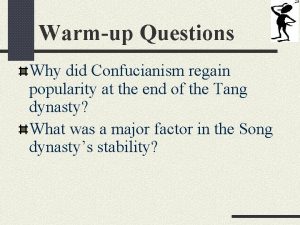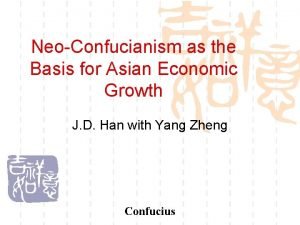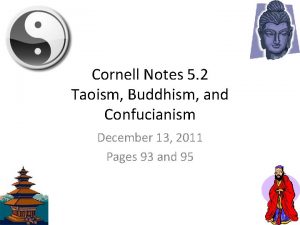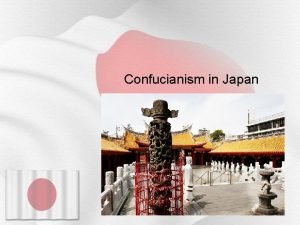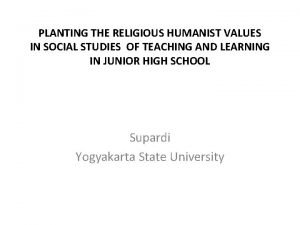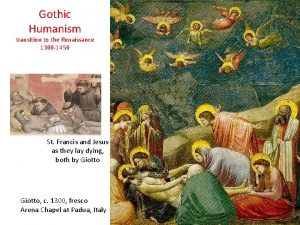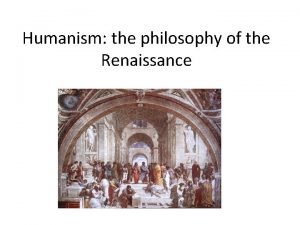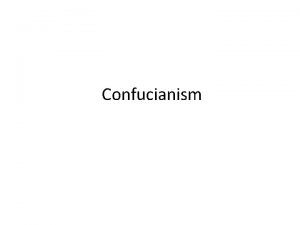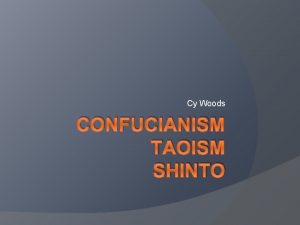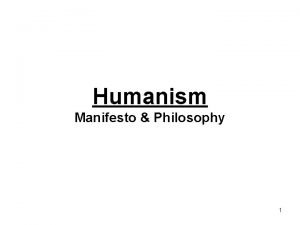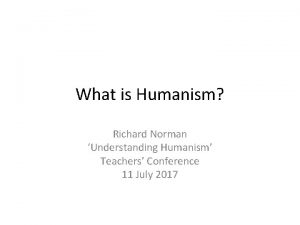Confucianism What is Confucianism Confucianism is humanism a









- Slides: 9

Confucianism

What is Confucianism? Confucianism • is humanism, a philosophy or attitude that is concerned with human beings, their achievements and interests, rather than with the abstract beings and problems of theology. In Confucianism man is the center of the universe: man cannot live alone, but with other human beings. For human beings, the ultimate goal is individual happiness. The necessary condition to achieve happiness is through peace. To obtain peace, Confucius discovered human relations consisting of the five relationships which are based on love and duties. War has to be abolished; and the Great Unity of the world should be developed. • The Human beings are supposed to love one another in the name of God, but they are killing one another in the name of God.

History • Confucianism means "The School of the Scholars"; or, less accurately, "The Religion of Confucius") is an East Asian ethical and philosophical system originally developed from the teachings of the early Chinese sage Confucius. It is a complex system of moral, social, political and religious which had tremendous influence on the history of Chinese civilization down to the 20 th century.

History (con’t) • Some have considered it to have been the "state religion" of imperial China. Debated during the Warring States Period and forbidden during the short-lived Qin Dynasty, Confucianism was chosen by Han Wudi for use as a political system to govern the Chinese state • Despite its loss of influence during the Tang Dynasty, Confucianist doctrine remained a mainstream Chinese orthodoxy for two millennia until the beginning of the 20 th century, when it was vigorously repressed by Chinese Communism.

Who was…. . • Confucius (551 - 479 BCE) was a famous sage and social philosopher of China whose teachings deeply influenced East Asia for twenty centuries. The relationship between Confucianism and Confucius himself, however, is tenuous. Confucius' ideas were not accepted during his lifetime and he frequently bemoaned the fact that he remained unemployed by any of the feudal lords.

Historiography • we do not have direct access to Confucius' ideas. Instead, we have recollections by his disciples and their students • the "Burning of the Books and Burying of the Scholars", a massive suppression of dissenting thought during the Qin Dynasty, more than two centuries after Confucius' death. What we now know of Confucius' writings and thoughts is therefore somewhat unreliable.

The Analects • The Analects of Confucius, the closest we have to a primary source for his thoughts, relates the discussions with his disciples in short sayings • This book contains a compilation of questions and answers, excerpts from conversations, and anecdotes from Confucius' life – “Lead the people with administrative injunctions and put them in their place with penal law, and they will avoid punishments but will be without a sense of shame. Lead them with excellence and put them in their place through roles and ritual practices, and in addition to developing a sense of shame, they will order themselves harmoniously. ” (Analects II, 3)

• His writings deal primarily with individual morality and ethics, and the proper exercise of political power by the rulers. • Confucius argues that under law, external authorities administer punishments after illegal actions, so people generally behave well without understanding reasons why they should; whereas with ritual, patterns of behavior are internalized and exert their influence before actions are taken, so people behave properly because they fear shame and want to avoid losing face.

Beliefs: • Confucian ethical teachings include the following values: – Li: includes ritual, propriety, etiquette, etc. – Hsiao: love within the family: love of parents for their children and of children for their parents – Yi: righteousness – Xin: honesty and trustworthiness – Jen: benevolence, humaneness towards others; the highest Confucian virtue – Chung: loyalty to the state, etc.
